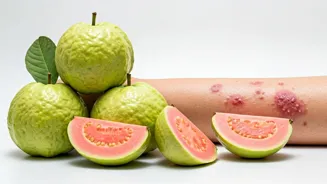Diabetic Patients' Concerns
For individuals managing diabetes, the consumption of guava requires careful consideration due to its potential impact on blood sugar levels. While guava boasts
a relatively low glycemic index (GI), meaning it doesn't cause a rapid spike in blood sugar, its natural sugars can still affect glucose control. The overall impact varies depending on the ripeness of the guava and the quantity consumed. Ripe guavas contain higher sugar levels than unripe ones, influencing the glycemic response. Moreover, the fiber content in guava, though beneficial for slowing down sugar absorption, might not fully offset the effects in people with diabetes. Therefore, diabetic individuals should monitor their blood sugar levels after eating guava, and consider incorporating the fruit into their diet in moderation. It's advisable to pair it with other foods that have a lower GI or include healthy fats and protein to further regulate the glucose response. Consulting a healthcare professional or a registered dietitian is always recommended to get personalized guidance aligned with individual health conditions and medication schedules.
Eczema or Sensitive Skin
Individuals with eczema or sensitive skin should exercise caution when consuming guava. Guava contains compounds that may trigger or exacerbate skin irritation in susceptible individuals. These compounds include certain natural chemicals and fruit acids that can cause redness, itching, and inflammation in those with compromised skin barriers. The reaction can be more pronounced in people with eczema, as their skin is already prone to dryness and irritation. For sensitive individuals, even small amounts of guava may be sufficient to trigger a flare-up. Moreover, the consumption of guava can sometimes lead to indirect contact dermatitis, where the skin reacts not by direct contact, but after the fruit has been ingested and the body reacts internally. People with skin sensitivities should start with small portions of guava and observe for any adverse reactions. Avoiding guava altogether or only consuming it sparingly is advisable if any skin symptoms arise following consumption. Furthermore, it is worth noting that external applications of guava products, such as guava leaf extracts or skincare products containing guava, could also elicit a similar response. If reactions occur, it is best to consult a dermatologist.
Frequent Bloating Considerations
Those who frequently experience bloating might find that guava can worsen their symptoms. This effect is largely linked to the fruit's fiber content. While fiber is an essential part of a healthy diet, aiding in digestion and promoting regular bowel movements, excessive intake can lead to increased gas production and, consequently, bloating in some individuals. Guava contains a considerable amount of fiber, and consuming it in large quantities can thus contribute to bloating. The fruit's natural sugars, such as fructose, can also be a contributing factor for some people. Fructose that is not fully absorbed in the small intestine may be fermented by gut bacteria in the large intestine, leading to the production of gas. Individuals who are prone to bloating or those with Irritable Bowel Syndrome (IBS) often find that high-fiber foods exacerbate their condition. If guava is suspected of triggering or worsening bloating, it is advisable to limit intake. Also, monitor how the fruit affects the body and consider eating smaller portions. It is helpful to consult with a healthcare professional for guidance on managing bloating symptoms through dietary adjustments and other interventions.
IBS Patients & Guava
For individuals suffering from Irritable Bowel Syndrome (IBS), guava consumption can be a double-edged sword, potentially triggering or worsening symptoms in some cases. IBS is a gastrointestinal disorder characterized by a variety of symptoms, including abdominal pain, cramping, bloating, diarrhea, and constipation. High-fiber foods like guava can have a variable impact on IBS sufferers. While fiber is beneficial for some, it can worsen symptoms for others, particularly those with diarrhea-predominant IBS. Guava's fiber content can sometimes increase bowel motility, leading to more frequent and loose stools. Moreover, the natural sugars in guava, especially fructose, might not be well-absorbed in the small intestine for some people, which can lead to fermentation by gut bacteria and increased gas production, thereby worsening bloating and discomfort. If guava exacerbates IBS symptoms, it is wise to reduce or avoid consumption. Individuals with IBS should monitor their body's reaction to guava, and make adjustments in their diet. Consulting a gastroenterologist or a registered dietitian is essential for personalized dietary advice to effectively manage IBS symptoms.





















